SHAFR Conference Prize Announcements, 2023
At this year’s awards presentation at the SHAFR Conference, we recognized some of the best scholarship of the previous year, determined by some of SHAFR’s hardest working volunteers on our prize committees.
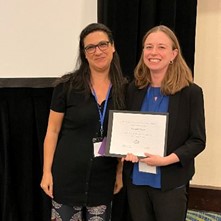 This year's Betty Miller Unterberger Dissertation Prize committee—chaired by Megan Threlkeld and including Nicole Anslower and Karine Walther (pictured with the winner to the left)—awarded this year’s prize to Samantha Payne, who earned her Ph.D. from Harvard University in 2022 (under the direction of Sven Beckert) and is currently an Assistant Professor of History at the College of Charleston. In her dissertation, "The Last Atlantic Revolution: Reconstruction and the Struggle for Democracy in the Americas, 1861-1912," Dr. Payne argues that white elites in the United States, Cuba, and Brazil responded to the revolutionary crisis of the U.S. Civil War by collaborating on a white supremacist legal regime to ensure Black exclusion from democratic politics. Based on archival research in three languages and demonstrating an impressive command of scholarship from multiple countries, Dr. Payne's work successfully challenges the notion that Reconstruction in the United States was a "unique and unparalleled" experiment in democracy, showing instead that it was rooted in the Black Atlantic, born of the collective experience of Afro-descendants across the Americas.
This year's Betty Miller Unterberger Dissertation Prize committee—chaired by Megan Threlkeld and including Nicole Anslower and Karine Walther (pictured with the winner to the left)—awarded this year’s prize to Samantha Payne, who earned her Ph.D. from Harvard University in 2022 (under the direction of Sven Beckert) and is currently an Assistant Professor of History at the College of Charleston. In her dissertation, "The Last Atlantic Revolution: Reconstruction and the Struggle for Democracy in the Americas, 1861-1912," Dr. Payne argues that white elites in the United States, Cuba, and Brazil responded to the revolutionary crisis of the U.S. Civil War by collaborating on a white supremacist legal regime to ensure Black exclusion from democratic politics. Based on archival research in three languages and demonstrating an impressive command of scholarship from multiple countries, Dr. Payne's work successfully challenges the notion that Reconstruction in the United States was a "unique and unparalleled" experiment in democracy, showing instead that it was rooted in the Black Atlantic, born of the collective experience of Afro-descendants across the Americas.
 The members of the Unterberger Prize committee also awarded an Honorable Mention to Amanda Waterhouse, who earned her Ph.D. from Indiana University in 2022 under the direction of Nick Cullather. Dr. Waterhouse's dissertation, "Grassroots Architects: Planning, Protest, and U.S. Foreign Aid in Cold War Colombia," persuasively argues that architecture was a form of U.S. aid during the Cold War, used in conjunction with Colombian officials to control dissent and maintain public order. Drawing on a wide range of archival sources and oral histories, she shows, however, that these efforts instead gave rise to a grassroots movement by university students to push back against that public order.
The members of the Unterberger Prize committee also awarded an Honorable Mention to Amanda Waterhouse, who earned her Ph.D. from Indiana University in 2022 under the direction of Nick Cullather. Dr. Waterhouse's dissertation, "Grassroots Architects: Planning, Protest, and U.S. Foreign Aid in Cold War Colombia," persuasively argues that architecture was a form of U.S. aid during the Cold War, used in conjunction with Colombian officials to control dissent and maintain public order. Drawing on a wide range of archival sources and oral histories, she shows, however, that these efforts instead gave rise to a grassroots movement by university students to push back against that public order.
Ji Soo Hong of Brown University is the winner of this year’s Marilyn Blatt Young Dissertation Completion Award. The committee–chaired by Tore Olsson and including Monica Kim and Kate Burlingham–found this dissertation project unusually original and 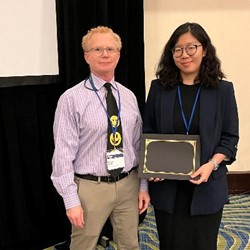 innovative. SHAFR Vice President Mitch Lerner (pictured with the winner) made the award. “Business of Détente: Petroleum, Petrochemicals, and the Making of U.S.-USSR Economic Relations, 1956-1982” examines the decades after World War II and explores how the United States and Soviet Union became both major extractors and refiners of petroleum and increasingly devoted to producing synthetic materials–particularly plastics–with that oil. As it turns out, this mutual interest in extracting and processing petrochemicals eclipsed the seemingly insurmountable distinctions between capitalism and communism. Ji Soo Hong’s unusually original and innovative dissertation shows how U.S.-Soviet cooperation, trade, and exchange in the field of synthetic materials broke down barriers between the two and ultimately made possible the 1970s experiment of détente. Like other scholars have done recently, Hong reveals that the two superpowers shared a tremendous deal in their economic and ecological outlook and that acknowledging their cooperation is essential to understanding humanity’s environmental transformations of the twentieth century. The award committee was unanimous in their admiration for the originality of Hong’s project and her wide-reaching language skills in Russian, German, and the technical prose of petroleum experts, alongside her strengths in crafting an engaging and persuasive narrative. This dissertation, once completed and revised, promises to become a vital book in U.S., Russian, Cold War, and environmental history.
innovative. SHAFR Vice President Mitch Lerner (pictured with the winner) made the award. “Business of Détente: Petroleum, Petrochemicals, and the Making of U.S.-USSR Economic Relations, 1956-1982” examines the decades after World War II and explores how the United States and Soviet Union became both major extractors and refiners of petroleum and increasingly devoted to producing synthetic materials–particularly plastics–with that oil. As it turns out, this mutual interest in extracting and processing petrochemicals eclipsed the seemingly insurmountable distinctions between capitalism and communism. Ji Soo Hong’s unusually original and innovative dissertation shows how U.S.-Soviet cooperation, trade, and exchange in the field of synthetic materials broke down barriers between the two and ultimately made possible the 1970s experiment of détente. Like other scholars have done recently, Hong reveals that the two superpowers shared a tremendous deal in their economic and ecological outlook and that acknowledging their cooperation is essential to understanding humanity’s environmental transformations of the twentieth century. The award committee was unanimous in their admiration for the originality of Hong’s project and her wide-reaching language skills in Russian, German, and the technical prose of petroleum experts, alongside her strengths in crafting an engaging and persuasive narrative. This dissertation, once completed and revised, promises to become a vital book in U.S., Russian, Cold War, and environmental history.
Jaeyoung Ha, a graduate student at the University of California, San Diego, received Honorable Mention for the Young Fellowship. His dissertation project, entitled “Frontier above the Clouds: Trans-Pacific Development, Colonization, and the Rehabilitation of South Korean Mountains, 1945-1972,” examines the post-World War II effort by U.S. technical experts to increase humanity’s agricultural output. They did not merely target the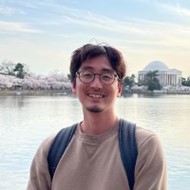 verdant lowlands, valleys, and plains that provided most of humanity’s agricultural output but were also attracted to mountainous highlands, which they saw as both potential bastions of anti-communism and vital sources of industrial raw materials. This was especially apparent in South Korea, where upland development projects were particularly transformative. Jaeyoung Ha’s nuanced and ground-breaking dissertation reveals how U.S. technocrats and their South Korean allies relocated a vast number of highland subsistence farmers and sought to forcefully convert them into miners who would expand South Korea’s industrial manufacturing. This effort built both on Japanese colonial precedent and on the U.S.’s own practices of reordering mountain life in the West and southern Appalachia during the first half of the twentieth century. As the first but hardly the last upland development project in East Asia, the experience in South Korea’s mountains rippled outward in the years that followed. The award committee was deeply impressed by the novelty and originality of Ha’s research and by the rich array of primary sources he is using to tell that story. We expect that this will become a vital addition to Korean history, Cold War history, the history of the U.S. in the world, and development studies.
verdant lowlands, valleys, and plains that provided most of humanity’s agricultural output but were also attracted to mountainous highlands, which they saw as both potential bastions of anti-communism and vital sources of industrial raw materials. This was especially apparent in South Korea, where upland development projects were particularly transformative. Jaeyoung Ha’s nuanced and ground-breaking dissertation reveals how U.S. technocrats and their South Korean allies relocated a vast number of highland subsistence farmers and sought to forcefully convert them into miners who would expand South Korea’s industrial manufacturing. This effort built both on Japanese colonial precedent and on the U.S.’s own practices of reordering mountain life in the West and southern Appalachia during the first half of the twentieth century. As the first but hardly the last upland development project in East Asia, the experience in South Korea’s mountains rippled outward in the years that followed. The award committee was deeply impressed by the novelty and originality of Ha’s research and by the rich array of primary sources he is using to tell that story. We expect that this will become a vital addition to Korean history, Cold War history, the history of the U.S. in the world, and development studies.
 The Stuart L. Bernath Scholarly Article Prize was awarded to Emilie Connolly’s “Fiduciary Colonialism: Annuities and Native Dispossession in the Early United States,” from The American Historical Review. The committee—chaired by Alex Beasley and including Theresa Keeley (pictured below with the Honorable Mention winner) and Mattias Fibiger—found it an innovative and forcefully argued reassessment of the mechanisms by which the U.S. gained control over Native land and governance in the early republic. Connolly examines federal administration of annuities paid to Native nations, which were the form of compensation offered for some Native land that was not expropriated by pure force. As Connolly shows, this compensation was not a one-time payment but rather a prolonged commitment to pay over a period of many years. The annuity system “endowed federal officials with the discretion to decide how, where, and if each installment would be disbursed,” in the process “providing the levers to pry Indigenous people from their homelands and compel their migration.” The annuity relationship, imagined as payment negotiated between sovereign nations, became a means to shrink Native land claims and, ultimately, undermine Native sovereignty altogether within the “non-violent” context of economic exchange. This framework enriches our understanding of American settler colonialism and Native American history while also suggesting new avenues of research for imperial relationships outside of North America.
The Stuart L. Bernath Scholarly Article Prize was awarded to Emilie Connolly’s “Fiduciary Colonialism: Annuities and Native Dispossession in the Early United States,” from The American Historical Review. The committee—chaired by Alex Beasley and including Theresa Keeley (pictured below with the Honorable Mention winner) and Mattias Fibiger—found it an innovative and forcefully argued reassessment of the mechanisms by which the U.S. gained control over Native land and governance in the early republic. Connolly examines federal administration of annuities paid to Native nations, which were the form of compensation offered for some Native land that was not expropriated by pure force. As Connolly shows, this compensation was not a one-time payment but rather a prolonged commitment to pay over a period of many years. The annuity system “endowed federal officials with the discretion to decide how, where, and if each installment would be disbursed,” in the process “providing the levers to pry Indigenous people from their homelands and compel their migration.” The annuity relationship, imagined as payment negotiated between sovereign nations, became a means to shrink Native land claims and, ultimately, undermine Native sovereignty altogether within the “non-violent” context of economic exchange. This framework enriches our understanding of American settler colonialism and Native American history while also suggesting new avenues of research for imperial relationships outside of North America.
Samantha Payne’s “’A General Insurrection in the Countries with Slaves’: The US Civil War and the Origins of an Atlantic Revolution, 1861-1866,” from Past & Present received Honorable Mention for the Bernath Article Prize. It shows the far-reaching political implications of the U.S. Civil War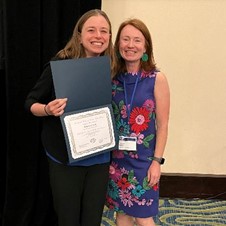 within the slave societies of Cuba and Brazil. During the war, slave-owners in these countries (rightly) feared that the war in the U.S. threatened their own institution of slavery, and state officials worried about a revolution led by enslaved people that would jeopardize the nations themselves. Upon receiving news of the war in the United States, enslaved Brazilians and Cubans began to flee plantations in larger numbers and to organize revolts, expecting that the upheaval in the U.S. would make abolition within their own nations more possible. Brazilian and Cuban elites ultimately passed “gradual emancipation laws,” or “freedom of the womb” legislation, to ensure the freedom of any future descendants of enslaved people. Payne bridges the divide between earlier generations of scholars, who argued for the causality of the U.S. Civil War in prompting these reforms among the elites, and more recent work from social historians, who emphasized the role of local enslaved people’s demands in forcing concessions from slave-owners and state officials. As Payne shows, “the end of the Civil War precipitated the abolition of slavery in Cuba and Brazil because of the actions of” the enslaved people, who were themselves inspired by the news coming from the United States. In making this case, Payne demonstrates the effect of faraway developments on the thought and action of subaltern actors in Brazil and Cuba, compellingly integrating diplomatic/international and social/cultural history.
within the slave societies of Cuba and Brazil. During the war, slave-owners in these countries (rightly) feared that the war in the U.S. threatened their own institution of slavery, and state officials worried about a revolution led by enslaved people that would jeopardize the nations themselves. Upon receiving news of the war in the United States, enslaved Brazilians and Cubans began to flee plantations in larger numbers and to organize revolts, expecting that the upheaval in the U.S. would make abolition within their own nations more possible. Brazilian and Cuban elites ultimately passed “gradual emancipation laws,” or “freedom of the womb” legislation, to ensure the freedom of any future descendants of enslaved people. Payne bridges the divide between earlier generations of scholars, who argued for the causality of the U.S. Civil War in prompting these reforms among the elites, and more recent work from social historians, who emphasized the role of local enslaved people’s demands in forcing concessions from slave-owners and state officials. As Payne shows, “the end of the Civil War precipitated the abolition of slavery in Cuba and Brazil because of the actions of” the enslaved people, who were themselves inspired by the news coming from the United States. In making this case, Payne demonstrates the effect of faraway developments on the thought and action of subaltern actors in Brazil and Cuba, compellingly integrating diplomatic/international and social/cultural history.
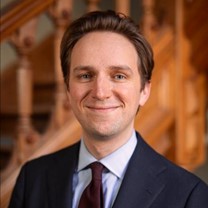 The Stuart L. Bernath Book Prize is awarded to the best first book in the field. This year’s committee–chaired by Gretchen Heefner and including Colleen Woods and David Milne–makes the award to Nicholas Mulder’s The Economic Weapon: The Rise of Sanctions as a Tool of Modern War, whichis an incisive, revelatory history of the rise of sanctions as a tool of war and diplomacy. Focusing primarily on 1914 to 1945, Mulder demonstrates, in compelling prose, how sanctions come to be accepted as an essential instrument of “peacekeeping” and charts the varied consequences of this turn. The rise of the United States to pre-eminence normalized and widened the use of sanctions, weaponizing interdependence in a global economic system the United States devised and dominates. But a major theme that Mulder teases out is the sharp disconnect, as he describes it, between “effects” and “efficacy.” This profound and ambitious book—published by Yale University Press—deepens our understanding of the way the U.S. deploys its non-military, yet brutalizing, power and critiques the economic determinism that has led proponents of sanctions to exaggerate their coercive impact, again and again.
The Stuart L. Bernath Book Prize is awarded to the best first book in the field. This year’s committee–chaired by Gretchen Heefner and including Colleen Woods and David Milne–makes the award to Nicholas Mulder’s The Economic Weapon: The Rise of Sanctions as a Tool of Modern War, whichis an incisive, revelatory history of the rise of sanctions as a tool of war and diplomacy. Focusing primarily on 1914 to 1945, Mulder demonstrates, in compelling prose, how sanctions come to be accepted as an essential instrument of “peacekeeping” and charts the varied consequences of this turn. The rise of the United States to pre-eminence normalized and widened the use of sanctions, weaponizing interdependence in a global economic system the United States devised and dominates. But a major theme that Mulder teases out is the sharp disconnect, as he describes it, between “effects” and “efficacy.” This profound and ambitious book—published by Yale University Press—deepens our understanding of the way the U.S. deploys its non-military, yet brutalizing, power and critiques the economic determinism that has led proponents of sanctions to exaggerate their coercive impact, again and again.
 Honorable Mention for the Bernath Book Prize was also awarded to Tessa Winkelmann’s Dangerous Intercourse: Gender and Interracial Relations in the American Colonial Philippines, 1898–1946. This elegantly written and deeply researched exploration of interracial relationships in the American colonial Philippines traces interracial relationships from the outset of U.S. colonial conquest through the end of colonial rule in 1946. Winkelman convincingly demonstrates how “transgressions of the sexual color line” worked to consolidate U.S. imperial rule. Though dangerous to the racial order that buttressed colonial rule, she shows that interracial sex could be strategically managed by the colonial state and society to soften the violence and exploitation at the heart of colonial rule. While Winkelman’s account of the gendered relations of power in the colonial Philippines is consistently attentive to the different consequences, particularly for Filipinas, of interracial intercourse, Dangerous Intercourse is ultimately an incisive critique of the “liberal justificatory logics of empire” that continue to shape relations between the United States and the Philippines.
Honorable Mention for the Bernath Book Prize was also awarded to Tessa Winkelmann’s Dangerous Intercourse: Gender and Interracial Relations in the American Colonial Philippines, 1898–1946. This elegantly written and deeply researched exploration of interracial relationships in the American colonial Philippines traces interracial relationships from the outset of U.S. colonial conquest through the end of colonial rule in 1946. Winkelman convincingly demonstrates how “transgressions of the sexual color line” worked to consolidate U.S. imperial rule. Though dangerous to the racial order that buttressed colonial rule, she shows that interracial sex could be strategically managed by the colonial state and society to soften the violence and exploitation at the heart of colonial rule. While Winkelman’s account of the gendered relations of power in the colonial Philippines is consistently attentive to the different consequences, particularly for Filipinas, of interracial intercourse, Dangerous Intercourse is ultimately an incisive critique of the “liberal justificatory logics of empire” that continue to shape relations between the United States and the Philippines.
The 2023 Michael H. Hunt Prize for International History is awarded to Victor Seow of Harvard University for his book Carbon Technocracy: Energy Regimes in Modern East Asia (by SHAFR Vice President Mitch Lerner is the photo below). The prize committee of Max Paul Friedman 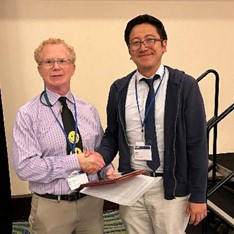 (chair), Jeremy Rich, and Katharina Rietzler found Dr. Seow’s book to be a highly original study emphasizing the centrality of energy extraction to questions of international politics, war, and diplomacy. The book blends a transnational history of science and technology with political economy, producing a beautifully written account of techno-utopian modernization projects surrounding Fushun, the largest coal mine in East Asia, that moves effortlessly from the global to the local. Seow depicts a wide range of actors, writing with a humane sensibility about the mining experience, discovering unexpected evidence of resistance and autonomy in the silences and allusions of the diverse evidentiary seams he excavates to yield their valuable material. He ranges widely across sources such as technical reports, novels, diaries, and correspondence, engaging scholarly debates on global mining frontiers and coercive labor regimes in imperial contexts. The result is not only a transnational history of mining and energy’s impact on politics, but also a new way of looking at the continuities among radically conflictual Chinese and Japanese states that claimed control of Fushun across the twentieth century. The committee congratulates Dr. Seow on his achievement.
(chair), Jeremy Rich, and Katharina Rietzler found Dr. Seow’s book to be a highly original study emphasizing the centrality of energy extraction to questions of international politics, war, and diplomacy. The book blends a transnational history of science and technology with political economy, producing a beautifully written account of techno-utopian modernization projects surrounding Fushun, the largest coal mine in East Asia, that moves effortlessly from the global to the local. Seow depicts a wide range of actors, writing with a humane sensibility about the mining experience, discovering unexpected evidence of resistance and autonomy in the silences and allusions of the diverse evidentiary seams he excavates to yield their valuable material. He ranges widely across sources such as technical reports, novels, diaries, and correspondence, engaging scholarly debates on global mining frontiers and coercive labor regimes in imperial contexts. The result is not only a transnational history of mining and energy’s impact on politics, but also a new way of looking at the continuities among radically conflictual Chinese and Japanese states that claimed control of Fushun across the twentieth century. The committee congratulates Dr. Seow on his achievement.
The Robert H. Ferrell Book Prize is awarded to reward distinguished scholarship in the history of American foreign relations, broadly defined. This year’s committee—Sarah Snyder (chair, pictured with the winner), Mario Del Pero, and Bernadette Whelan—awarded the prize to Elisabeth Leake 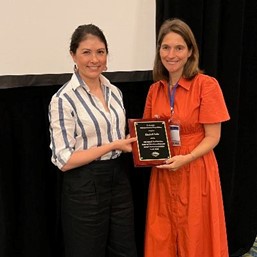 for Afghan Crucible: The Soviet Invasion and the Making of Modern Afghanistan, published by Oxford University Press. This timely work examines the history of the Soviet invasion and occupation of Afghanistan from a global perspective. Each chapter represents a deep examination of the conflict from multiple perspectives, and her study reveals the connected histories of great power competition, anti-colonial modernity, postcolonial statehood, international relations, and Cold War realities. It shows, once more, how outside Europe the Cold War often acted as a multiplier of violence. Afghan Crucible is a richly detailed narrative based on extensive research in Russian, American, Indian, Afghan, British, and United Nations records. These diverse sources enable Leake to illuminate decision-making by the Iranian and Pakistani governments as well as the Carter and Reagan administrations, the response of the United Nations High Commissioner for Refugees to the displacement of Afghans into Pakistan, and debates at the U.N. General Assembly and Security Council. As one committee member said, Afghan Crucible is “international history at its best.”
for Afghan Crucible: The Soviet Invasion and the Making of Modern Afghanistan, published by Oxford University Press. This timely work examines the history of the Soviet invasion and occupation of Afghanistan from a global perspective. Each chapter represents a deep examination of the conflict from multiple perspectives, and her study reveals the connected histories of great power competition, anti-colonial modernity, postcolonial statehood, international relations, and Cold War realities. It shows, once more, how outside Europe the Cold War often acted as a multiplier of violence. Afghan Crucible is a richly detailed narrative based on extensive research in Russian, American, Indian, Afghan, British, and United Nations records. These diverse sources enable Leake to illuminate decision-making by the Iranian and Pakistani governments as well as the Carter and Reagan administrations, the response of the United Nations High Commissioner for Refugees to the displacement of Afghans into Pakistan, and debates at the U.N. General Assembly and Security Council. As one committee member said, Afghan Crucible is “international history at its best.”
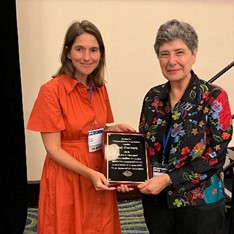 The 2023 Anna K. Nelson Prize for Archival Excellence honors an archivist who has demonstrated both exemplary expertise as well as outstanding and dedicated service over time to the community of scholars of the history of U.S. foreign relations and international history. With this year’s award SHAFR’s Historical Documentation Committee—Sarah Snyder (chair—pictured to the left with the winner), Hannah Gurman, Tom Zeiler, Kelly McFarland, and Jim Brennan—chose to acknowledge an archivist who has long served SHAFR members--Dr. Wendy Chmielewski. A scholar of women’s history and peace movements, Dr. Chmielewski is honored for her leadership as the George R. Cooley Curator of the Swarthmore College Peace Collection for over twenty years. In that role, she oversaw the expansion the collection’s records, made detailed finding aids for many of them available on the internet, highlighted many of its print and graphic materials on its website, and added a public history component to this archival repository. In these ways and others, she has been a driving force in making the Swarthmore College Peace Collection an indispensable resource for scholars of the American peace movement and the history of U.S. foreign relations more broadly. Beyond the peace collection at Swarthmore, Dr. Chmielewski has also been a member of the advisory committee of the American Museum for Peace, the Jane Addams Papers Project at Ramapo College, and the Centre for Peace History at the University of Sheffield. SHAFR recognizes her for this work and her multiple contributions to the study of U.S. foreign relations.
The 2023 Anna K. Nelson Prize for Archival Excellence honors an archivist who has demonstrated both exemplary expertise as well as outstanding and dedicated service over time to the community of scholars of the history of U.S. foreign relations and international history. With this year’s award SHAFR’s Historical Documentation Committee—Sarah Snyder (chair—pictured to the left with the winner), Hannah Gurman, Tom Zeiler, Kelly McFarland, and Jim Brennan—chose to acknowledge an archivist who has long served SHAFR members--Dr. Wendy Chmielewski. A scholar of women’s history and peace movements, Dr. Chmielewski is honored for her leadership as the George R. Cooley Curator of the Swarthmore College Peace Collection for over twenty years. In that role, she oversaw the expansion the collection’s records, made detailed finding aids for many of them available on the internet, highlighted many of its print and graphic materials on its website, and added a public history component to this archival repository. In these ways and others, she has been a driving force in making the Swarthmore College Peace Collection an indispensable resource for scholars of the American peace movement and the history of U.S. foreign relations more broadly. Beyond the peace collection at Swarthmore, Dr. Chmielewski has also been a member of the advisory committee of the American Museum for Peace, the Jane Addams Papers Project at Ramapo College, and the Centre for Peace History at the University of Sheffield. SHAFR recognizes her for this work and her multiple contributions to the study of U.S. foreign relations.
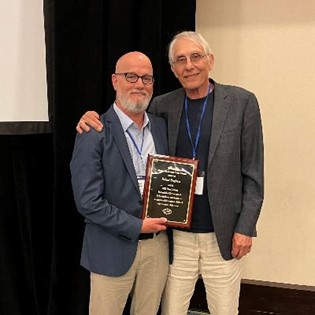 The Peter L. Hahn Distinguished Service Award recognizes a long-time SHAFR member “whose service demonstrates a deep commitment to the organization’s mission of promoting and disseminating” foreign relations scholarship, and for mentorship, teaching, and other important service. This year’s committee–chaired by Mel Leffler and also including Kristin Hoganson and Frank Costigliola (pictured with the winner)–makes the award to Robert K. Brigham, the Shirley Ecker Boskey Professor of History and International Relations at Vassar College.
The Peter L. Hahn Distinguished Service Award recognizes a long-time SHAFR member “whose service demonstrates a deep commitment to the organization’s mission of promoting and disseminating” foreign relations scholarship, and for mentorship, teaching, and other important service. This year’s committee–chaired by Mel Leffler and also including Kristin Hoganson and Frank Costigliola (pictured with the winner)–makes the award to Robert K. Brigham, the Shirley Ecker Boskey Professor of History and International Relations at Vassar College.
Professor Brigham has amassed an impressive record of service to SHAFR over the decades. He has served on Council, as Program Committee Co-Chair, on the Board of Editors of Diplomatic History, on the advisory board for Passport, on the Development and Membership committees, and on the Myrna Bernath and Norman and Laura Graebner prize committees. Among Professor Brigham's most significant contributions has been his outstanding mentorship of undergraduates at Vassar College. An award-winning teacher, he has inspired generations of students to study foreign relations history, leading them to enter the field in a diversity of ways, including the academy and public service. Professor Brigham’s former students have not only become SHAFR members, but have also distinguished themselves as important contributors, thereby helping ensure the future vibrancy of the organization. For his vision, dedication, and hard work, the committee is proud to recognize Bob with the Peter L. Hahn Distinguished Service Award.

